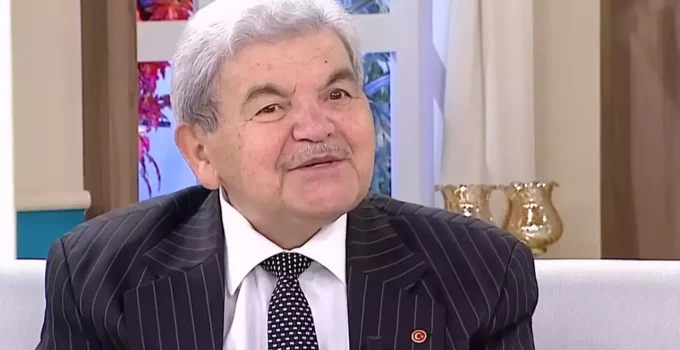Yusuf Kavaklı, an eminent Islamic scholar, has made significant contributions to Islamic thought, education, and interfaith dialogue in the contemporary world. His work bridges the gap between traditional Islamic teachings and the modern challenges faced by Muslims globally. In 2024, Yusuf Kavaklı continues to be a guiding light for many, emphasizing the importance of education, tolerance, and the application of Islamic principles in everyday life. This article explores his life, contributions, and the impact he has had on both the Muslim community and the broader world.
Contents
Early Life and Education Yusuf Kavaklı

Yusuf Kavaklı was born in Istanbul, Turkey, in 1951. Growing up in a family with strong religious values, he was exposed to Islamic teachings from a young age. His early education was marked by a deep interest in religious studies, and he excelled in learning the Quran and Hadith. Kavaklı pursued his higher education at the prestigious Al-Azhar University in Cairo, where he studied Islamic theology, jurisprudence, and philosophy.
During his time at Al-Azhar, Kavaklı was influenced by prominent scholars who emphasized the importance of understanding Islam in the context of modernity. This perspective shaped his approach to Islamic scholarship, focusing on how traditional teachings could be applied to contemporary issues.
Career and Contributions
After completing his studies, Yusuf Kavaklı returned to Turkey, where he began his career as an educator and religious leader. His early work involved teaching at various Islamic institutions and universities, where he gained a reputation for his deep knowledge and engaging teaching style.
Educational Initiatives
One of Kavaklı’s most significant contributions has been in the field of education. He has been a strong advocate for reforming Islamic education to make it more relevant to the modern world. Kavaklı believes that education should empower individuals to think critically and apply Islamic principles in practical ways. He has authored numerous textbooks and educational materials that are used in Islamic schools and universities around the world.
In 2024, Kavaklı’s educational initiatives have expanded to include online courses and digital platforms, making his teachings accessible to a global audience. His approach combines traditional Islamic scholarship with modern pedagogical methods, ensuring that students not only learn the fundamentals of Islam but also how to engage with contemporary issues from an Islamic perspective.
Interfaith Dialogue
Yusuf Kavaklı is also known for his efforts in promoting interfaith dialogue. He has participated in numerous conferences and forums that bring together religious leaders from different faiths to discuss common challenges and opportunities for collaboration. Kavaklı believes that mutual understanding and respect are essential for peaceful coexistence in a multicultural world.
His work in interfaith dialogue has been instrumental in building bridges between Muslim communities and people of other faiths. He emphasizes the common values shared by all religions, such as compassion, justice, and the pursuit of knowledge. In 2024, Kavaklı continues to be a leading voice in interfaith initiatives, advocating for dialogue and cooperation as means to address global issues like poverty, climate change, and social injustice.
Social and Political Engagement
In addition to his educational and interfaith work, Yusuf Kavaklı has been actively involved in social and political issues affecting Muslims worldwide. He has spoken out on various platforms about the need for Muslims to engage constructively with political processes and advocate for their rights. Kavaklı encourages Muslims to participate in civic life and contribute to the development of their societies.
He has also addressed the challenges faced by Muslim minorities in non-Muslim majority countries, advocating for their rights and providing guidance on how to maintain their religious identity while integrating into broader society. His balanced approach, which respects both religious principles and secular laws, has earned him respect among diverse communities.
Publications and Media Presence

Yusuf Kavaklı is a prolific writer, having authored over 30 books on various aspects of Islam, including theology, jurisprudence, ethics, and spirituality. His writings are characterized by clarity and accessibility, making complex Islamic concepts understandable to a wide audience. His books have been translated into several languages, further extending his influence.
In 2024, Kavaklı’s presence extends beyond
traditional print media to include a strong presence in digital and social media. He regularly appears on television programs, participates in webinars, and maintains an active online presence through social media platforms and his own website. This digital engagement allows him to reach a younger audience and address contemporary issues in real-time, making his teachings more relevant and accessible.
Approach to Contemporary Issues
One of Yusuf Kavaklı’s most notable attributes is his ability to address contemporary issues through the lens of Islamic teachings. He believes that Islam provides timeless principles that can guide individuals and communities in the modern world. Some of the key issues he has focused on include:
Gender Equality
Kavaklı is an advocate for gender equality, emphasizing that Islam supports the rights and dignity of women. He argues that many cultural practices that oppress women are not rooted in Islamic teachings but are rather a result of patriarchal traditions. He encourages educational and social reforms to ensure that women have equal opportunities in all spheres of life. In his lectures and writings, Kavaklı often cites examples from Islamic history where women played significant roles in society.
Technology and Modernity
Recognizing the rapid advancements in technology, Kavaklı addresses how Muslims can navigate the challenges and opportunities presented by modernity. He advocates for the ethical use of technology, encouraging Muslims to embrace innovation while adhering to Islamic ethical principles. This includes discussions on topics like artificial intelligence, social media ethics, and the digital economy.
Environmental Stewardship
Kavaklı is also a proponent of environmental stewardship, drawing on Islamic teachings that emphasize the importance of caring for the Earth. He highlights the concept of “Khilafah” (stewardship) and how Muslims have a responsibility to protect and preserve the environment. He has been involved in various initiatives promoting sustainable practices and has called for a collective effort to address climate change.
Mental Health
Understanding the growing awareness of mental health issues, Kavaklı integrates Islamic perspectives on mental well-being into his teachings. He encourages open discussions about mental health within the Muslim community and advocates for seeking professional help when needed. He emphasizes the importance of spiritual practices, such as prayer and meditation, in maintaining mental health, while also recognizing the need for modern medical interventions.
Challenges and Criticisms

Despite his many contributions, Yusuf Kavaklı has hometogel login faced challenges and criticisms. Some conservative scholars have criticized his progressive views, particularly on issues like gender equality and interfaith dialogue. They argue that his interpretations of Islamic teachings are too liberal and not in line with traditionalist views.
Kavaklı addresses these criticisms by emphasizing the importance of Ijtihad (independent reasoning) in Islam. He argues that Islam is a dynamic religion that allows for interpretations to adapt to changing circumstances while remaining rooted in core principles. He encourages constructive dialogue and believes that differing opinions can coexist within the framework of Islamic jurisprudence.
Legacy and Impact
Yusuf Kavaklı’s impact on the Muslim world and beyond is significant. His work has inspired many to seek a deeper understanding of their faith and how it can be applied to modern challenges. Through his educational initiatives, he has influenced a generation of scholars and students who continue to carry forward his vision of a balanced, progressive approach to Islam.
Kavaklı’s emphasis on education, dialogue, and engagement has also helped to counter negative stereotypes about Islam and Muslims. By promoting a message of peace, tolerance, and intellectual inquiry, he has contributed to a more nuanced understanding of Islam in the global context.
Conclusion Yusuf Kavaklı
Yusuf Kavaklı’s journey from a young student in Istanbul to a globally recognized Islamic scholar is a testament to his dedication, intellect, and vision. In 2024, he continues to be a beacon of knowledge and wisdom, guiding Muslims through the complexities of the modern world. His contributions to education, interfaith dialogue, and social issues have left an indelible mark on the Muslim community and have fostered greater understanding and cooperation between people of different faiths and cultures.
Kavaklı’s legacy is one of bridging tradition with modernity, showing that the timeless teachings of Islam can offer valuable guidance in addressing contemporary challenges. As he continues his work, Yusuf Kavaklı remains a source of inspiration and a guiding light for those seeking to live a life of faith, integrity, and purpose in the 21st century.
Read More Article About “Potato Pancakes: A Delicious Tradition with Global Appeal”




